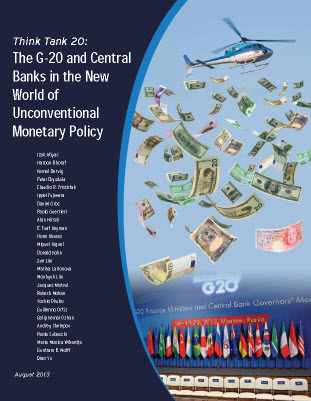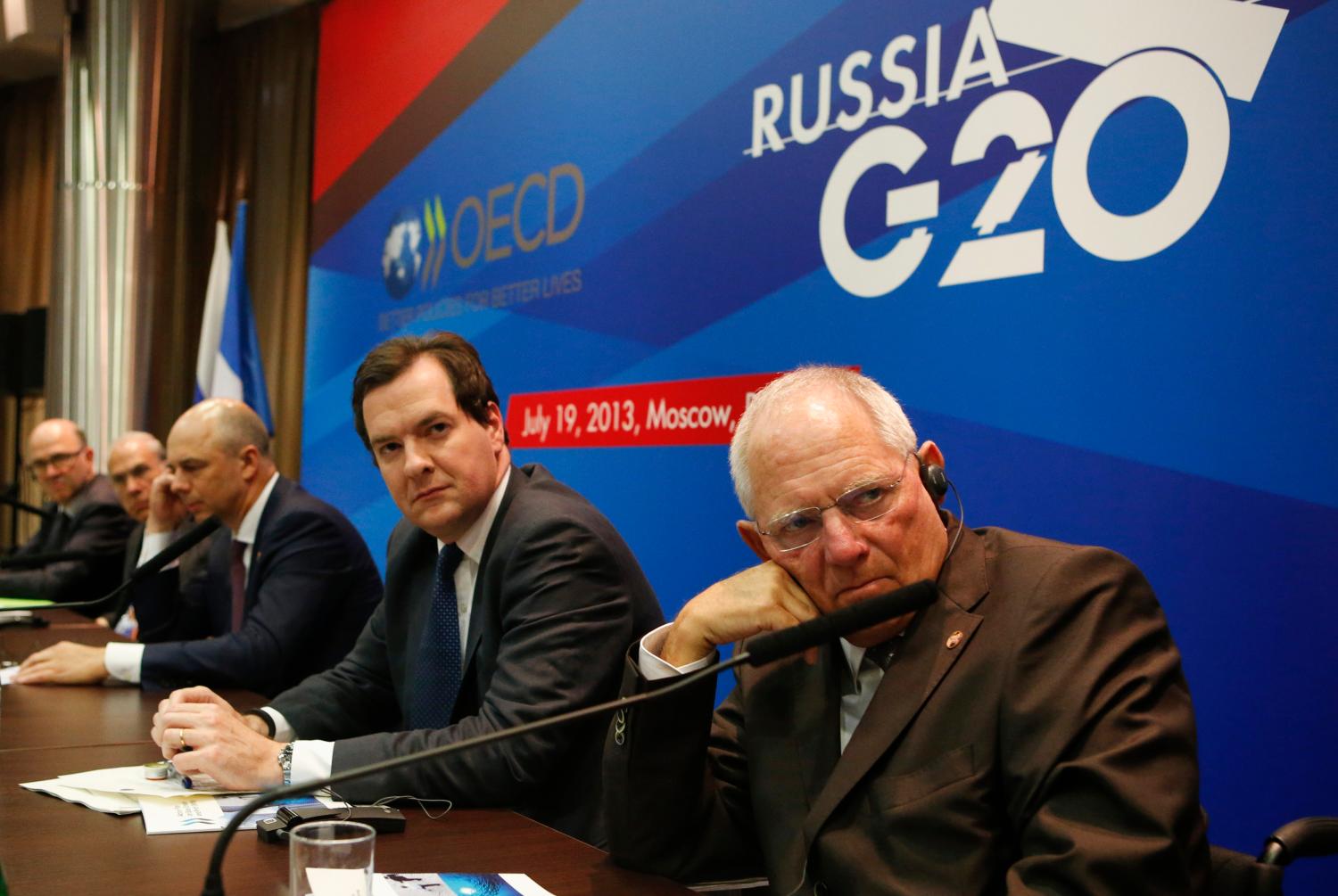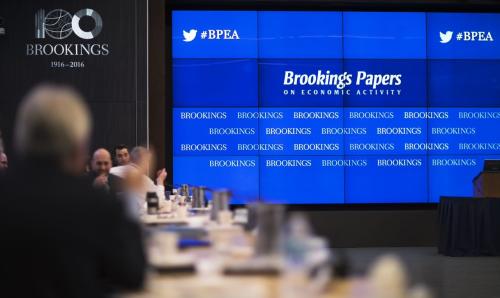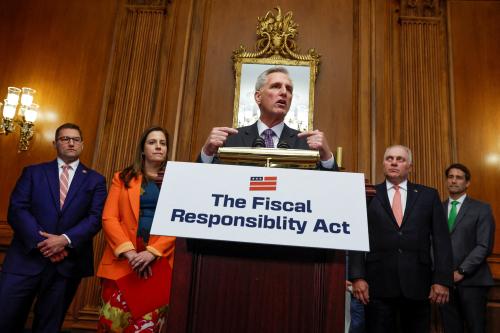Five years after the first meeting of G-20 leaders, and decisive action by the central banks and treasuries of the world’s major economies that prevented the financial crisis of 2008-2009 from turning into a 1930’s style world-wide depression, the world economy still remains fragile. The original fiscal stimulus agreed upon in the April 3rd 2009 second leader’s level G-20 London meeting has been withdrawn in the U.S. and Europe after 2011, not through a coordinated decision of the G-20, but in response to fears of rising public debt and a political process in which these fears came to dominate the debate. In China too, fiscal policy became less expansive, after the mega-stimulus of 2009, although a mini-stimulus has been declared for the summer of 2013 to counter a greater than expected output slowdown.
 Monetary policy, however, remained extraordinarily expansionary in the U.S., the U.K., Japan and the eurozone. The balance sheets of the Federal Reserve (Fed), the Bank of England (BoE), the Bank of Japan (BoJ) and the European Central Bank (ECB) expanded by $2 trillion, £310 billion, ¥50 trillion, and €1.5 trillion, respectively between December 2007 and December 2012. The Fed’s, the BoE’s, the BoJ’s and the ECB’s balance sheets were as big as 6 percent, 7 percent, 21 percent and 15 percent of their GDP in 2007, whereas in 2012, their balance sheets represented 19 percent, 27 percent, 33 percent and 32 percent of their 2012 GDP levels, respectively. Repeated rounds of quantitative easing no doubt helped the U.S. economy recover, and the actions of the ECB prevented the crisis in the eurozone periphery to spin entirely out of control.
Monetary policy, however, remained extraordinarily expansionary in the U.S., the U.K., Japan and the eurozone. The balance sheets of the Federal Reserve (Fed), the Bank of England (BoE), the Bank of Japan (BoJ) and the European Central Bank (ECB) expanded by $2 trillion, £310 billion, ¥50 trillion, and €1.5 trillion, respectively between December 2007 and December 2012. The Fed’s, the BoE’s, the BoJ’s and the ECB’s balance sheets were as big as 6 percent, 7 percent, 21 percent and 15 percent of their GDP in 2007, whereas in 2012, their balance sheets represented 19 percent, 27 percent, 33 percent and 32 percent of their 2012 GDP levels, respectively. Repeated rounds of quantitative easing no doubt helped the U.S. economy recover, and the actions of the ECB prevented the crisis in the eurozone periphery to spin entirely out of control.
INTRODUCTION
The G-20 and Central Banks in the New World of Unconventional Monetary Policy
Kemal Derviş
Vice President, Global Economy and Development, The Brookings Institution; Former Executive Head of the United Nations Development Program; Former Secretary of Treasury and Economy Minister, The Republic of Turkey; Advisor, Istanbul Policy Center
Senior Fellow and Deputy Director, Global Economy and Development, The Brookings Institution;Former Chief Economist, East Asia, The World Bank
![]() Read the introduction in PDF »
Read the introduction in PDF »
Argentina’s Debt: the Good, the Bad and the Ugly
Miguel Kiguel
Former Under Secretary of Finance and Chief Advisor to the Minister of the Economy, Argentina; Former President, Banco Hipotecario; Director, Econviews; Professor, Universidad Torcuato Di Tella
![]() Read the chapter on Argentina in PDF »
Read the chapter on Argentina in PDF »
AUSTRALIA
How Should the World View Japan’s New Economic Policy Strategy?
Peter Drysdale
Emeritus Professor of Economics, Crawford School of Economics and Government, The Australian National University; Head of the East Asian Bureau of Economic Research;
Co-editor, East Asia Forum
Ippei Fujiwara
Associate Professor, Crawford School of Public Policy, The Australian National University
![]() Read the chapter on Australia in PDF »
Read the chapter on Australia in PDF »
The World under the New G-4 (and the Rest of Us)
Claudio R. Frischtak
President, Inter.B Consulting and Country Director, International Growth Center
![]() Read the chapter on Brazil in PDF »
Read the chapter on Brazil in PDF »
CHINA
Handcuff Central Banks, Save The Global Market
Qiao Yu
Professor, School of Public Policy and Management, Tsinghua University
Xue Lan
Professor and Dean, School of Public Policy and Management, Tsinghua University
![]() Read the chapter on China in PDF »
Read the chapter on China in PDF »
EUROPEAN UNION
The ECB’s OMT Programme and German Constitutional Concerns
Guntram B. Wolff
Director, Bruegel
![]() Read the chapter on the European Union in PDF »
Read the chapter on the European Union in PDF »
FRANCE
Uncomfortable Exits: A Tale of Two Lenders of Last Resort
Jacques Mistral
Nonresident Senior Fellow, The Brookings Institution; Special Advisor, Institut Français des Relations Internationales; Former Economic Advisor to the French Prime Minister
![]() Read the chapter on France in PDF »
Read the chapter on France in PDF »
The World Economy According to an Excess Savings Country
Daniel Gros
Director, Centre for European Policy Studies (CEPS), Brussels
![]() Read the chapter on Germany in PDF »
Read the chapter on Germany in PDF »
Need for Thought Diversity to Combat Group-Think in Central Banking
Rakesh Mohan
Executive Director, International Monetary Fund; former Professor, Yale University; Deputy Governor, Reserve Bank of India
![]() Read the chapter on India in PDF »
Read the chapter on India in PDF »
Poor Politics That Destabilized the Good Economy
Maria Monica Wihardja
Part-time lecturer, University of Indonesia; former researcher, Centre for Strategic and International Studies, Jakarta
![]() Read the chapter on Indonesia in PDF »
Read the chapter on Indonesia in PDF »
ITALY
The Rise of Unemployment in the Eurozone: the Worst of the Crisis is Not Over
Paolo Guerrieri
Professor of Economics, University of Rome Sapienza; Professor, College of Europe, Bruges
![]() Read the chapter on Italy in PDF »
Read the chapter on Italy in PDF »
JAPAN
Overcoming Deflation and Moving Forward
Yoshio Okubo
Vice-Chairman, Japan Securities Dealers Association (JSDA)
![]() Read the chapter on Japan in PDF »
Read the chapter on Japan in PDF »
Global Imbalances, Financial Crisis and Economic Recovery
Wonhyuk Lim
Director and Vice President, Department of Competition Policy, Korea Development Institute (KDI)
![]() Read the chapter on Korea in PDF »
Read the chapter on Korea in PDF »
MEXICO
QE Exit and the Emerging Market Challenge
Guillermo Ortiz
Chairman, Grupo Financiero Banorte; Former Governor, Bank of Mexico; Former Secretary of Finance and Public Credit, Mexico; Former Chairman of the Board of the Bank for International Settlements
![]() Read the chapter on Mexico in PDF »
Read the chapter on Mexico in PDF »
RUSSIA
Reinvigorating Growth Potential: Priorities for the Central Bank of Russia
Marina Larionova
Professor and Head of International Organizations Research Institute, Higher School of Economics, National Research University
Andrey Shelepov
Researcher, Global Governance Research Center, International Organizations Research Institute, Higher School of Economics,
National Research University
![]() Read the chapter on Russia in PDF »
Read the chapter on Russia in PDF »
The Political Economy of Monetary Policy in South Africa: Real Economy Outcomes
Haroon Bhorat
Professor, Development Policy Research Unit, School of Economics, University of Cape Town
Alan Hirsch
Professor and Director, Graduate School of Development Policy and Practice, University of Cape Town
![]() Read the chapter on South Africa in PDF »
Read the chapter on South Africa in PDF »
TURKEY
Unconventional Monetary Policy and Its Reflections on the Global Economy
Galip Kemal Ozhan
Research Associate, The Brookings Institution
Izak Atiyas
Professor, Sabanci University
E. Fuat Keyman
Professor and Director, Istanbul Policy Center, Sabanci University
![]() Read the chapter on Turkey in PDF »
Read the chapter on Turkey in PDF »
UNITED KINGDOM
Coordinating the Next Move: Monetary Policy in the Post-crisis World
Paola Subacchi
Research Director, International Economics, Chatham House, London
![]() Read the chapter on the United Kingdom in PDF »
Read the chapter on the United Kingdom in PDF »
UNITED STATES
Unconventional Monetary Policy: Moving Toward the Exit in the U.S.
Former Vice Chairman of Federal Reserve Board of Governors; Senior Fellow, Economic Studies



